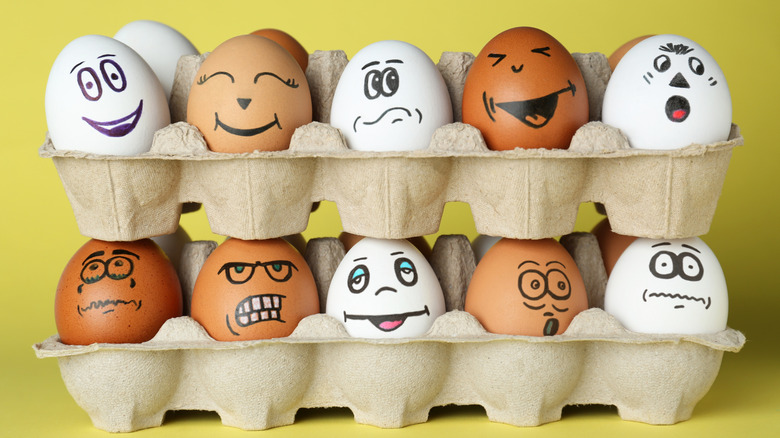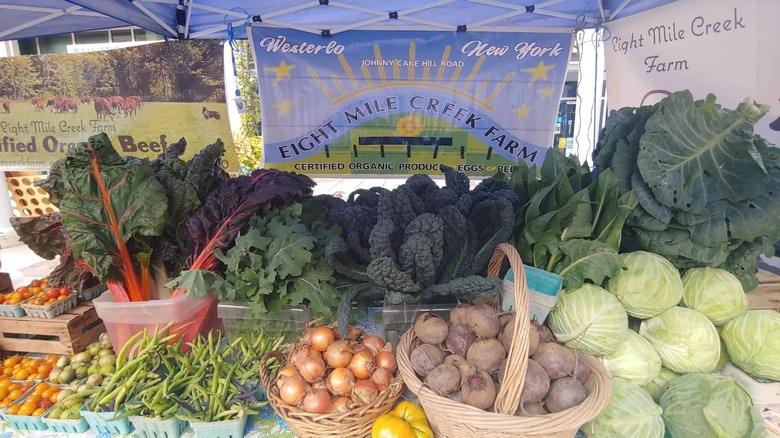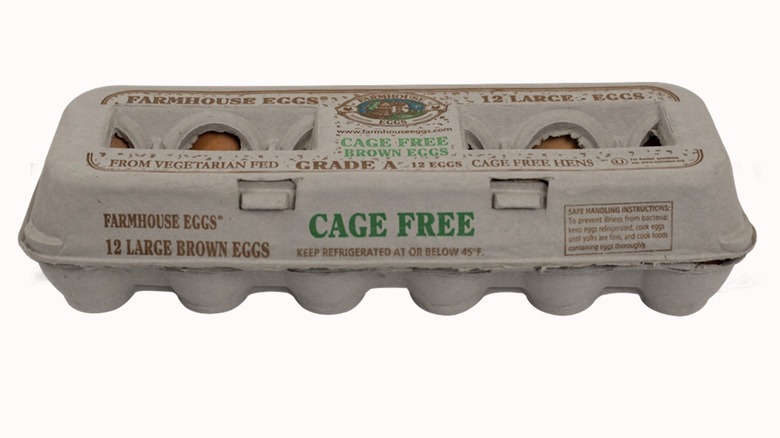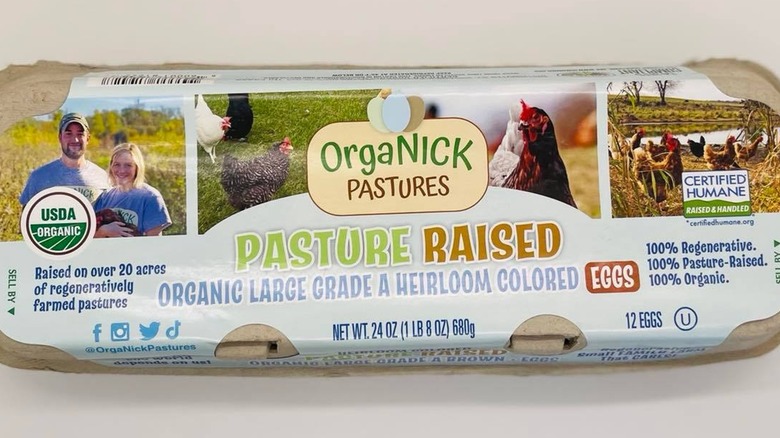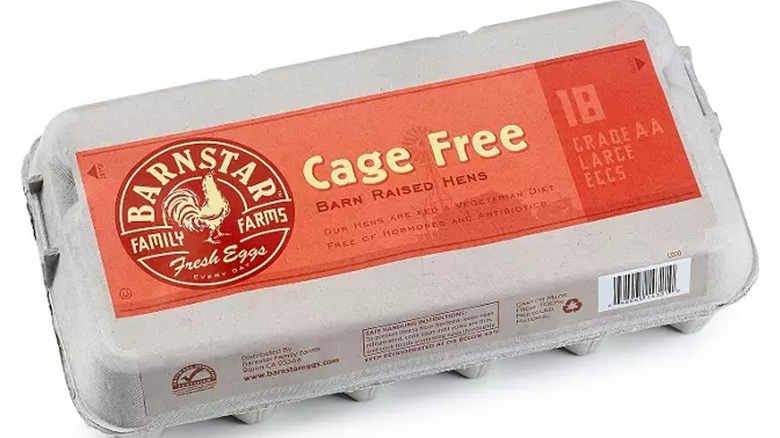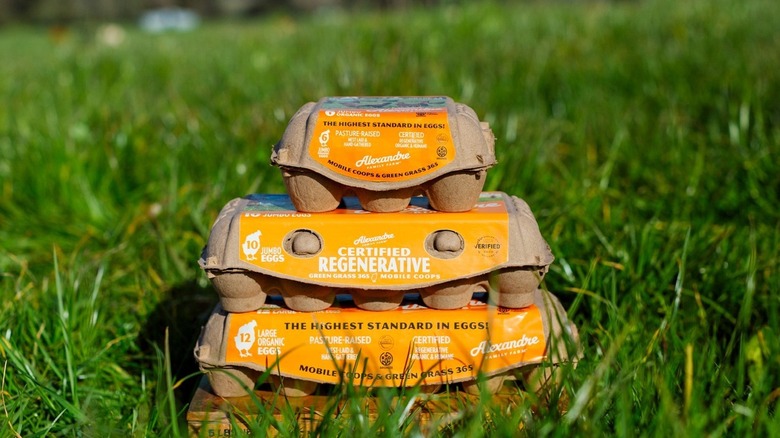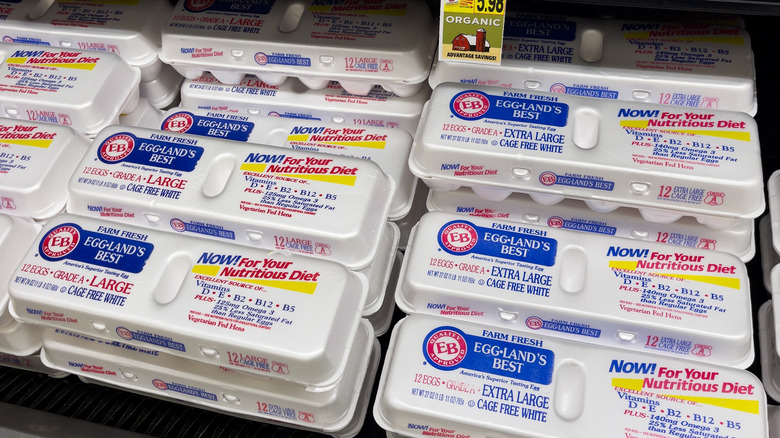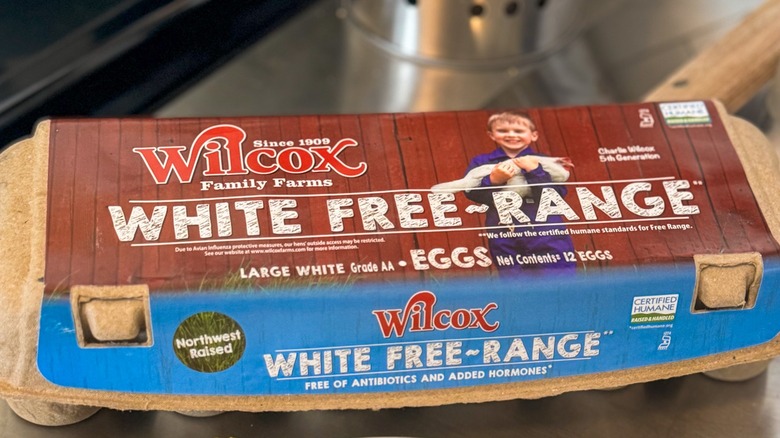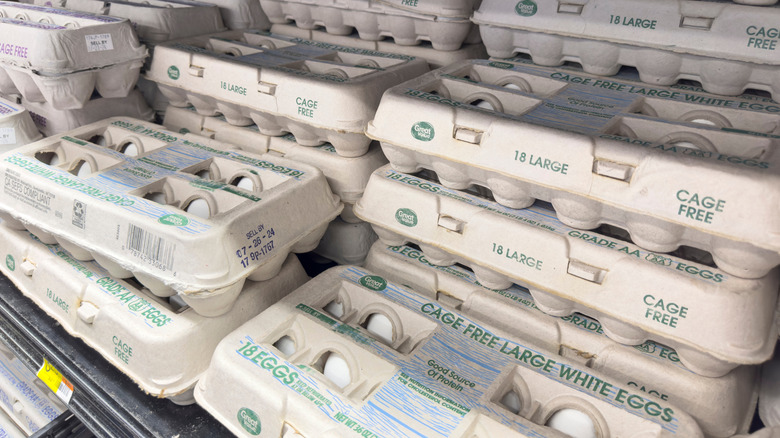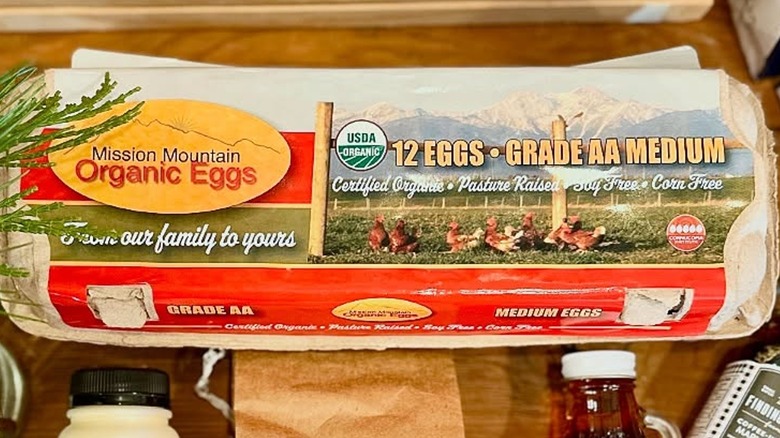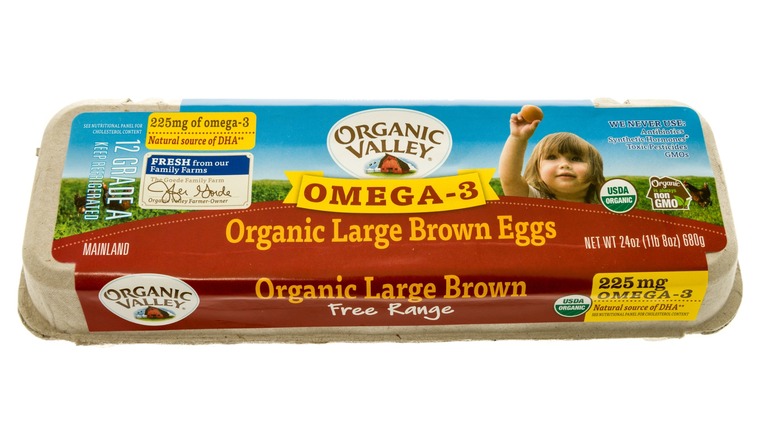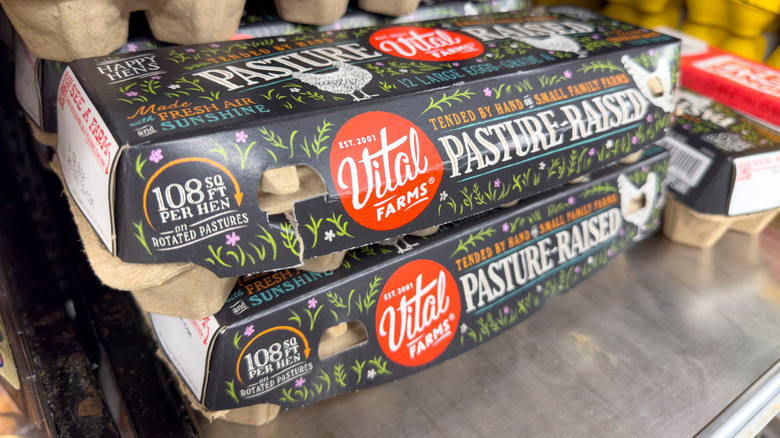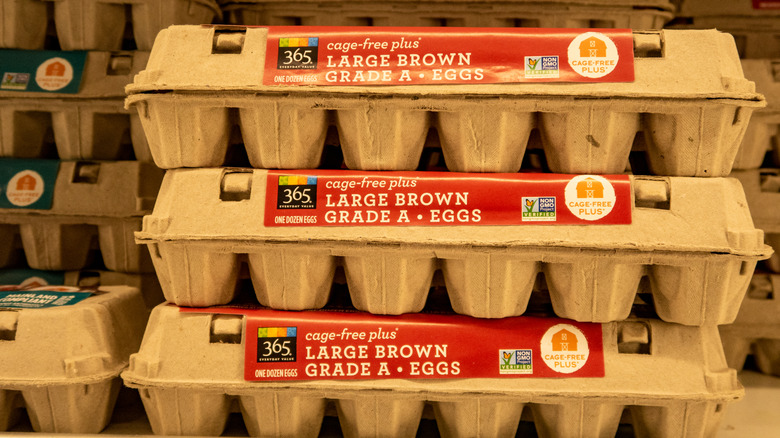The Highest And Lowest Quality Eggs On Grocery Store Shelves
We may receive a commission on purchases made from links.
Saying there are a lot of different egg brands to choose from on the grocery store shelves is an understatement. They're protein and nutrient-packed, endlessly versatile, and pretty much a beloved kitchen staple. However, making the right choice can leave you, well, a bit scrambled. For such a seemingly simple item, eggs can be brown or white, and their cartons can be riddled with terms like "cage-free" or "pasture-raised," and seals like "certified humane" or "USDA organic." Is it all marketing? Does it make any difference?
Before you can ask if your eggs are still fresh, you have to wonder if your eggs are even good. Typically, eggs that are more nutritious don't come from stressed or overcrowded chickens that are treated like little more than pieces on a factory line. Rather, high-quality eggs come from healthy, happy hens. To help you make more informed choices, we've sorted out some of the egg brands that take their hen's welfare seriously, and others brands that might be faking it. Check out some of our picks for highest and lowest quality eggs below.
Best: Eight Mile Creek Farm
Okay, so not everyone has the opportunity to buy locally, but we still thought that the potential best egg supplier in the U.S. deserved a shoutout. Eight Mile Creek Farm, spanning 430 acres in upstate New York, has been raising chickens and providing high-quality eggs since 2005. Taking home first place in Cornucopia Institute's Organic Egg Scorecard, Eight Mile Creek received five "eggs" –– the highest rating –– and amassed more than the maximum of 1,700 points.
Cornucopia Institute annually ranks over 100 U.S. egg brands, awarding points based on factors like the chickens' freedom to roam and the company's commitment to its organic label. For example, in 2024, Eight Mile Creek won full points in the categories of animal welfare, spacing, and dedication to the organic label. The farm sells its certified USDA organic eggs through an online store or CSA (community-supported agriculture) shares, making it easier to decide if it's worth it to spend a little more on pasture-raised eggs.
It's not always clear what all the different "organic" labels mean on your carton of eggs, but rankings like Cornucopia Institute's can spotlight which farms put their money where their mouth is, and which are just sneaking by. Eight Mile Creek's founder Pam Schreiber told Cornucopia, "The organic label gives my farm and my poultry products value by helping my customers have confidence that what they are buying is clean food: good for their health and protective of the environment."
Worst: Farmhouse Eggs (Cal-Maine)
Sometimes, choosing the best egg brand goes hand in hand with supporting ethical and transparent business practices. Farmhouse Eggs supplies its eggs nationwide, a much smaller branch of the giant parent company, Cal-Maine. Grouped in a joint venture with other brands like Land O'Lakes, Cal-Maine is the largest producer and distributor of eggs in the U.S.
When a company gets this big, it can naturally raise some questions about its commitment to high-quality product, or just racking up a nice profit. AP News reports that between 2004 and 2008, Cal-Maine conspired to reduce its production of eggs in order to increase prices. More recently, throughout the COVID-19 pandemic, Cal-Maine was accused of price gouging by 300% despite no supply chain issues, (via SFGate).
Awarded only 1 egg and 0 points on Cornucopia Institute's Organic Egg Scorecard, Farmhouse Eggs was criticized for not being transparent about how its hens are treated. While almost all of the brand's products are labeled "cage-free," for example, the loosely-defined term only means the chickens have space to move up and down, but means nothing regarding their access to the outdoors or uncrowded coops. Paired with the parent company's dodgy pricing tactics, it leads a consumer to wonder what else the business could be getting away with. Since Farmhouse Eggs is certified USDA organic and casts such a wide net, what's perhaps most concerning is the company's financial sway over the requirements (or lack thereof) of attaining the "organic" label.
Best: OrgaNick Eggs
OrgaNick Eggs gives us a bit of hope that bigger brands can also deliver high-quality eggs. The first certified humane, pasture-raised egg company in Wisconsin, OrgaNick Eggs was founded by Nick Westby and his family in 2019. Certified humane guarantees the hens a set amount of indoor space, while pasture-raised signifies at least six hours a day of roaming outside. Pasture-raised eggs are also thought to be more nutritious and better for the environment, since the hens are less stressed, eat a more varied diet, and support a healthier soil quality, (via Health.com).
While plenty of egg brands use these labels, a quick look through OrgaNick Eggs' website shows the company is serious about its practices. Photos show groups of black, red, and golden-brown hens clucking and curiously pecking their way through wide open pastures, unconstrained by tight spaces or crowded barns.
If you find a carton of OrgaNick Eggs at a Piggly Wiggly or Sprouts in the U.S., don't be surprised to find some cream-colored, blue, or even green eggs. That's right, you were wondering if brown eggs are better for you, and OrgaNick Eggs was throwing pastel into the equation. While egg shell color ultimately boils down to a hen's genetics, it can also indicate a chicken's access to a more natural diet, leading to better, more nutritious eggs.
Worst: Barnstar Family Farms (NuCal)
Another nationwide egg brand, California-based Barnstar Family Farms sells organic eggs through its own private label and through food distributors like NuCal Foods. Don't be fooled by the homely carton and "organic" branding, however, since the quality of the eggs can often suffer when distributed on such a grand scale. Barnstar's cartons proudly display "cage-free" and "barn-raised hens," but barn-raised could hint that the chickens have limited time or access to the outdoors. Barn-raised is an attractive label for bigger brands, since they can advertise their chickens as cage-free, while still crowding and squeezing as much out of the birds as possible. Overcrowding also comes with a higher risk of disease.
Barnstar's egg cartons also claim the hens are fed a vegetarian diet –– which could be interesting if you're vegetarian yourself –– but chickens are actually omnivores and at their healthiest with a diet of grains and insects. Beyond the ethical considerations of how we feed and treat our animals, poor practices directly impact the nutrition of our eggs. According to Health.com, genuine pasture-raised chickens live longer lives, producing eggs with higher concentrations of omega-3 fats and vitamins A and D.
Best: Alexandre Kids Eggs
One sure-fire way to tell if your eggs are high quality is the color of their yolk. Maybe you've seen it after buying some eggs from the farmers market, but crack them open and you'll find firm, dark yellow to orange yolks that scream flavor. Alexandre Family Farms –– a dairy, pork, and poultry farm in northern California –– takes a hands-on approach to producing eggs that reflects directly in the color of these eggs' yolks. As the brand explained on Facebook, "Our eggs are nest laid in our mobile coops where our hens have the ability to forage on lush green pastures year round... The natural tendency of the bird to forage outside and pick and scratch for food is what makes the difference in yolk color."
Although the farm's cartons are sold as Alexandre Kids Eggs, the eggs aren't only for those of us aged 10 and under. The name comes from the children in the Alexandre family that kickstarted the farm's egg production, with unique practices like portable coops and regenerative farming. This means the hens' coops are moved frequently on rotation around the farm, ensuring the chickens constantly have fresh pasture for grazing and allowing the earth to regrow after the birds have moved through. Alexandre Family Farm's more holistic approach to gathering eggs earned it the highest score of 5 "eggs" on Cornucopia Institute's Organic Egg Scorecard, even more impressive considering the brand's market area encompasses the entire West Coast.
Worst: Eggland's Best
You're probably more than familiar with Eggland's Best squeaky styrofoam cartons at Targets and Walmarts across the U.S., but you're best off steering clear of these eggs. The company has been involved in a mess of controversies; perhaps the most egregious being a 2024 lawsuit alleging that Eggland's Best marketed and charged more for eggs from free-range hens. In reality, these birds were crammed into sheds 20,000 at a time (via Reuters).
Part of the issue is labeling –– the USDA's requirements for what constitutes cage-free or free-range are rather vague –– meaning the hens' advertised "freedom" could actually be a patch of dirt. Additionally, if a bird's access to the outdoors is a small entrance in a crowded barn, it might not even be able to reach it.
Eggland's Best sells a variety of egg cartons, most of them touting the eggs as lower in saturated fat and extra-rich in vitamins. Agriculture Dive reports, however, that this marketing has been challenged after independent testing found the egg brand was falsifying nutritional info. The company's cartons also include the phrase "vegetarian-fed hens" –– which might beg the question WTF are vegetarian eggs –– but just know that healthy chickens eat meat, too. Vegetarian-fed can sometimes be code for synthetic additives in the chicken feed that compensate for a lack of animal protein.
Best: Wilcox Family Farms
When Wilcox Family Farms says its chickens are free range, they mean it. Scrolling through the farm's website shows various photos of chickens freely wandering through pastures, wooded areas, and in and out of coops, but even more refreshing is the company's transparency. Its pasture-raised and free-range standards are clearly outlined online, alongside the exceptions when chickens must be kept inside, like extreme weather conditions or a nearby risk of avian diseases.
For over 110 years, the Washington-based farm has stayed in the Wilcox family, distributing eggs to grocery stores along the West Coast and into Colorado and Montana. The farming family's practices mirror their belief that "healthy chickens are more productive." The birds follow a mobile coop throughout 1,600 acres of farmland, and are allowed to live as natural a lifestyle as possible, including scratching and dust bathing. Before domestication, chickens were various types of jungle fowl –– wild, flightless birds –– that, among other things, rolled around in the dirt to absorb and clean the oil from their feathers. Farms that give their chickens the liberty to perform these hardwired habits result in happier and healthier hens.
Worst: Great Value
Great Value is, unfortunately, not synonymous with great quality. The worst part about store-brand eggs –– like these from Walmart –– is the obscurity. Everything from where the eggs are produced to how the chickens are treated is cloaked in secrecy, leaving the consumer in the dark. Cornucopia Institute slammed Great Value with zero points and the lowest one "egg" rating on its Organic Egg Scorecard, primarily due to the brand's lack of transparency. Considering part of this transparency is as simple as responding to Cornucopia's survey and allowing for independent investigations, Great Value's tight-lipped approach probably indicates its eggs come from industrial farms, from chickens living in less-than-ideal conditions.
All of Great Value's egg cartons are labeled cage-free, but a damning undercover PETA investigation revealed how little this label can mean. After a whistleblower alerted the animal rights organization in 2020, private investigators discovered horrifying conditions and treatment of hens at an Ohio-based farm. PETA found cruel butchering practices, foul and filthy cages, and a reported 2.4 million hens crammed into 16 sheds. For the sake of the environment, animal welfare, and your own health, you can find much higher-quality eggs outside of Great Value.
Best: Mission Mountain
Nestled in western Montana, Mission Mountain Organic Eggs provides eggs to grocers across its home state and into Idaho and Washington. Unafraid to open its doors to the public, the egg brand's website shows photos of a school field trip touring the farm and getting a first-hand look at the production process. Mission Mountain's openness reflects positively on how the hens are treated and the quality of the eggs, earning the farm a 5 "egg" rating on Cornucopia Institute's Organic Egg Scorecard.
You can spot the superior quality of Mission Mountain's eggs in the yolk, which the farm described as orange in color and plump enough to sit upright in the skillet. Yolk color is not necessarily indicative of more nutritional value, rather it comes from elements called carotenoids which chickens cannot synthesize. Carotenoids are what give carrots and oranges their color, and are also more abundant in wholesome, natural chicken diets. It's normal for the yolk color to fluctuate throughout the year –– especially in the winter when lush pastures are barer –– but some brands will even add red chili flakes or marigold to the chicken's feed to deepen the hue and influence consumer perception. What's important is buying your eggs as locally as possible, from farms that are explicit about their practices and how they treat and feed their hens.
Worst: Organic Valley
To all appearances, buying Organic Valley eggs seems like a reasonable option. Founded in 1988, the company started with Midwest farmers fed up with the agricultural business. Today, it's a familiar and nationwide brand that's affordable, accessible, and checks off the healthy, organic eggs bullet point on your shopping list. Don't be so easily swayed by pictures of green pastures and organic branding, however, since the organic label doesn't always mean what you'd expect. If anything, while the USDA certified organic stamp of approval is a good start –– requiring cleaner and more ethical animal treatment –– it leaves an awful lot of wiggle room for lower quality brands to slip by.
Organic Valley, for example, came under fire in 2011 after a private investigation by Cornucopia Institute revealed the company was not adhering to organic label standards, (via The Seattle Times). The investigation found that a California-based Organic Valley farm limited its hens' outdoor access to a screened porch, with scarce sunlight and little room to perform natural behaviors. Following the incident, Organic Valley became more guarded with its practices, diminishing its overall accountability and rating on Cornucopia's Scorecard.
Best: Vital Farms
Open Vital Farms' website, and you'll be blasted with the brand's promise to keep things "bullsh*t free." It's cheeky, but when you consider that the company sources and distributes its eggs nationwide –– while pushing hard to stay ethical and organic –– you'll see the slogan is more like a battle cry. Such a widespread and recognizable brand is always going to be under more scrutiny, and shortly after going public in 2020, Vital Farms was sued by PETA for covert unethical practices. The lawsuit was dropped after some legal back-and-forth, but it didn't stop TikTok armchair investigators from running with it and trying to drag the brand's name.
Despite the heat, Vital Farms still earned a commendable "4-egg" rating on Cornucopia Institute's 2024 Scorecard, and the company was open to interview with Food and Wine's reporting –– showing a promising willingness and transparency. What consumers should understand is that it's no small feat to deliver eggs from free-range hens on a national scale. Vital Farms depends on many farms to source its eggs, and all of its pasture-raised egg cartons carry the Certified Humane® seal. While buying locally from providers who you can directly ask questions guarantees the highest-quality, ethical eggs, purchasing a carton of Vital Farms is still a safe grocery store bet.
Worst: 365
At times, Whole Foods Market has a bit of that elitism charm to it, where we're willing to go and spend the extra dollar for the semblance of a somehow superior product. Unfortunately, a lot of this is pure marketing and infectious consumer mindsets. 365's eggs, for example, are at best of questionable quality, and at worst, downright low quality. But that's the problem –– and the reason you shouldn't buy eggs at Whole Foods –– we as shoppers are left in the dark regarding the store-brand's practices. Cornucopia Institute gave the brand the lowest rating on its scorecard for a lack of any information of substance. Store brands often have very little interaction with the farmers who provide their eggs, and the chickens are likely raised on large-scale industrial farms.
Take a look at 365's egg cartons and you'll notice the gimmicky term "cage-free plus." According to the website, the term is some sort of an extra boost from cage-free, meaning additional room for the hens to move about indoors. Unfortunately though, "cage-free" doesn't prohibit certain practices like beak trimming –– a method used to prevent chickens from pecking each other –– that are ethically condoned by animal rights activists. Moreover, while 365 says that it sources eggs from pasture-raised chickens, the catchy phrase can sometimes mean hens have access to outdoor space, but live in cramped coops.
Methodology
To help us narrow down our list, we started with some of the most recognizable private and store labels for a more targeted consumer benefit, checking for brands that have been involved in lawsuits, scandals, or salmonella recalls. From there, we took inspiration from Cornucopia Institute –– a non-profit agricultural watchdog group –– that conducts yearly surveys and private investigations to compile its Organic Egg Scorecard.
While completing our list, we discovered one of the best indicators for high-quality eggs was ethical and humane animal practices. We prioritized farms that very clearly allowed their hens to roam pastures, eat natural diets, and perform hardwired behaviors. The labeling on cartons wasn't nearly as important as a farm's transparency –– those that made it into the lowest-quality category keep their practices behind closed doors. Finally, we gave special mentions to brands that sold statewide or nationwide, as it can be more challenging –– yet more admirable –– if a label can stay ethical while servicing a vast geographical area.
